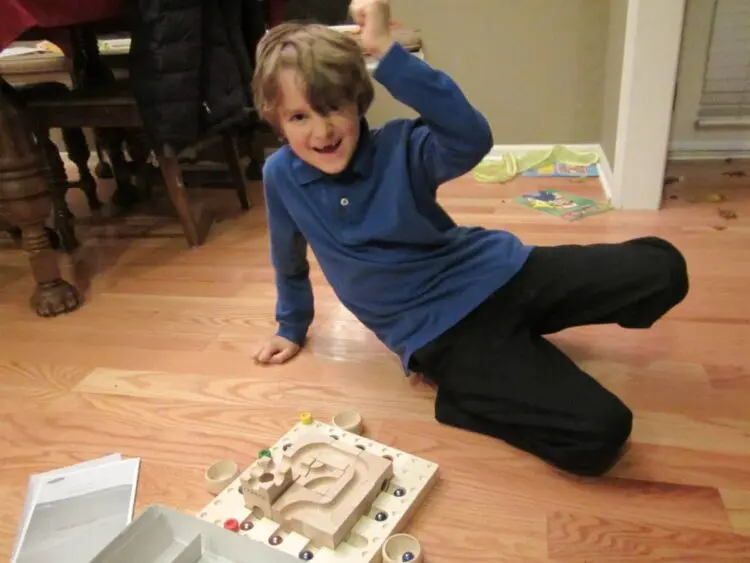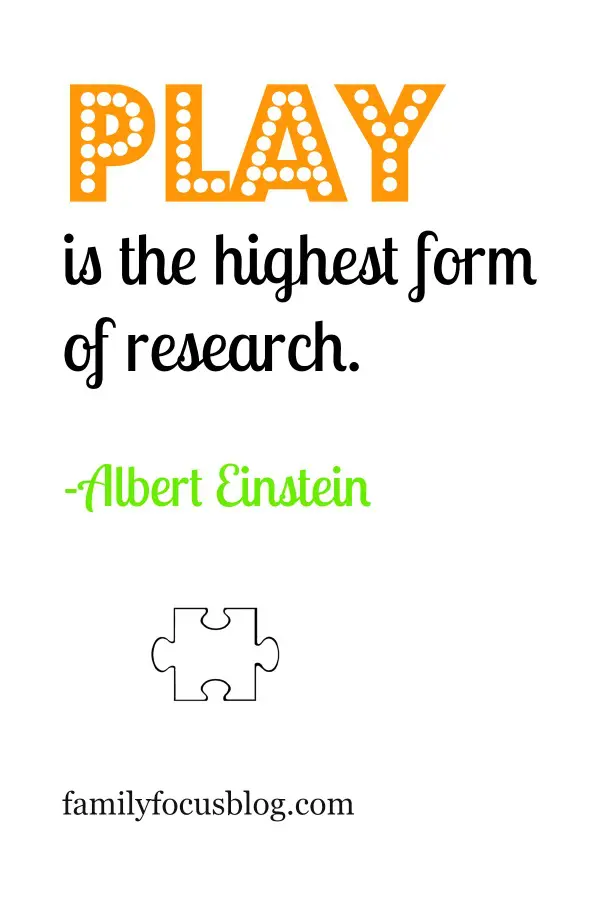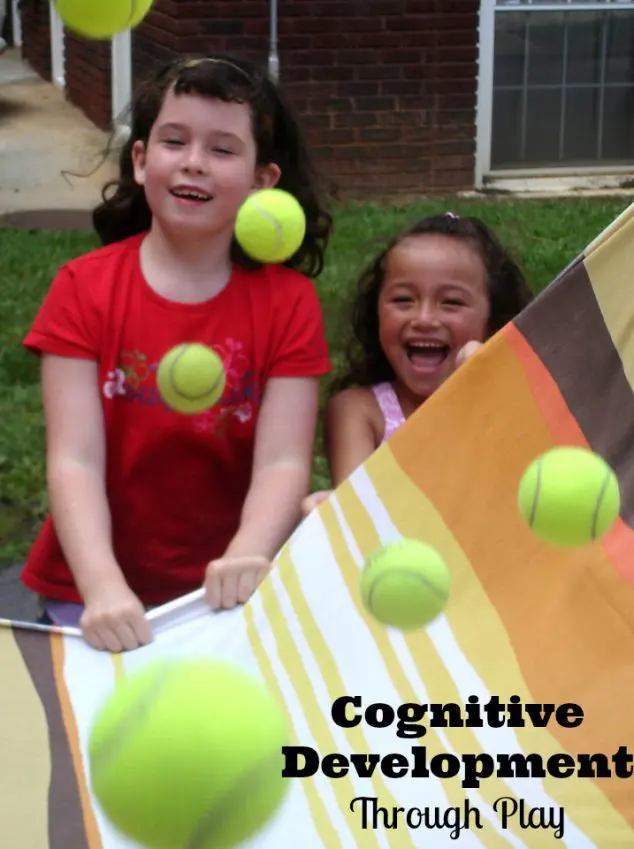Playtime is fun time but it is also learning time that improves cognitive skills and intellectual development. In fact, cognitive development through play comes easily and naturally to kids as they interact with the world around them. Not only do kids learn through play but fostering playtime also creates a love of learning. If you are thinking, how does play promote cognitive development? The answer is that cognitive play engages the brain. I am talking about all kinds of cognitive learning through building and making and manipulating, through roleplaying, and through planning and memorizing.

What is Cognitive Play?
Cognitive play refers to activities that stimulate a child’s thinking, problem-solving, memory, and creativity. These types of play engage the brain and help develop skills such as reasoning, decision-making, and understanding the world. Cognitive play can include structured and unstructured activities and is vital for intellectual and emotional development.
Examples of Cognitive Play:
- Puzzles and Games: Jigsaw puzzles, memory games, or board games like chess.
- Building and Construction: Using blocks, Legos, or other materials to create structures.
- Role-Playing and Pretend Play: Acting out scenarios like running a store or playing house, which helps develop problem-solving and social skills.
- Creative Arts: Drawing, painting, and crafting stimulate imagination and planning.
- Exploration Activities: Science experiments, scavenger hunts, or nature exploration encourage curiosity and logical thinking.
- Reading and Storytelling: Engaging with books, telling stories, or making up their own stories.
Cognitive play supports language development, social interactions, and the ability to focus and persevere through challenges. For children, it is an enjoyable way to learn and grow intellectually. Play and cognitive development in early childhood are intrinsically linked.
How can play promote intellectual development?
Play promotes intellectual development by engaging children in activities that stimulate their brains, encourage curiosity, and develop problem-solving and critical-thinking skills. Through play, children explore their environment, make sense of their experiences, and build foundational skills for lifelong learning.
There is no question that child development is helped along through play. Problem solving, improved language skills, and other cognitive development through play are a natural side effect of playing. In fact, studies indicate that play enhances early childhood development by 34%. Play is even important for improving a child’s social and emotional development as well as physical well-being. Even just 10 minutes of play improves children’s performance!
Pretend Play And Cognitive Development
Pretend play gets kids thinking and developing social skills. Young children start to think about what would happen next in this situation and how to problem solve when issues come up. They get to try out various responses and see what type of reactions they get. They are gathering immense amounts of experiential data. There are many benefits of pretend play. This type of free play is great for encouraging social interaction and language development. Pretend play and role-playing encourage children to think creatively, explore scenarios, and develop new ideas, fostering innovative thinking.
How Block Play Develops Cognitive Skills
Where pretend play allows kids to experiment and problem solve in social situations, block play allows them to do the same but with physical manipulation and dexterity. This type of constructive play improves their fine motor skills and allows them to start to see patterns. Building tall and skinny may make their creation more vulnerable to falling. Noticing cause and effect will naturally lead them experiment when other building methods. This is all a wonderful fun way to become familiar with early principles of science. It is a great way to encourage curiosity. In much the same way, the importance of play at board games is also critical to a child’s development and increasing their learning experiences.
Active Play
Physical activity and physical play may often get overlooked as contributing to brain development. However, the benefits of play are take many different forms. Physical health plays a vital role in healthy development. As kids engage in active play, they are also learning new things like how much energy certain activities will take. Critical thinking is beginning to develop as they choose which activities to do next and to create a natural order of activity and recovery periods.
Develops Language and Communication Skills
Interactive play, such as storytelling, puppet shows, or group games, helps children expand their vocabulary, practice conversational skills, and understand social cues.
Promotes Focus and Attention
Activities requiring sustained effort, such as board games or detailed crafts, help children develop patience and concentration.
Strengthens Social Understanding
Group play, whether structured or unstructured, teaches cooperation, negotiation, and empathy, all of which contribute to emotional and intellectual growth.
Sensory Play In Early Childhood
In early childhood, play acts as a bridge between imagination and real-world understanding, particularly through open-ended and exploratory activities. One lesser-discussed aspect is how sensory play, such as playing with sand, water, or textured materials, directly supports cognitive development. These activities help children process information from their environment, enhancing their ability to focus, classify objects, and make predictions.
For instance, experimenting with how water flows or how sand sticks together when wet introduces basic scientific principles in a hands-on way. Additionally, sensory play stimulates neural pathways, improving brain plasticity and laying a strong foundation for complex learning processes like reasoning and problem-solving. This type of play also fosters self-regulation as children learn to manage sensory input and navigate challenges independently, further contributing to their cognitive growth.

Role Of Play In Cognitive Development
Cognitive play is a vital component of cognitive development, offering children a dynamic and engaging way to explore the world, solve problems, and build foundational skills for learning. Through activities that foster creativity, critical thinking, memory, and communication, play nurtures intellectual growth while also supporting social and emotional well-being. By integrating play into daily routines, caregivers and educators can provide children with meaningful opportunities to develop their potential, laying the groundwork for lifelong curiosity, adaptability, and success.
Play promotes cognitive development by allowing children to explore and test how things work without pressure or judgement. They can imagine and experiment without expectations. All of this helps to build their self confidence to learn more. I hope you encourage your child to play and indulge them by playing with them sometime. You will get to see first hand how much they are learning. This is also a great way to strengthen your family bonds. Did you know about the importance of cognitive development through play? Will you help to spread the word?
Related Posts:
Do You Have Developmentally Appropriate Behavioral Expectations?


Sharisse says
Yes! Play is so very important to child development. Thank you for bringing awareness to the Play With Purpose campaign! Activities involving sorting, counting, or pattern recognition introduce basic math concepts and logical reasoning in a fun and engaging way.
Ask Helen says
Yes to this! Playing is really important for children’s development. It is also important to always spend time with your children. Play with purpose? Definitely a yes! By providing a variety of play experiences, caregivers and educators can create opportunities for children to learn in ways that are natural, enjoyable, and developmentally appropriate.
Laurence says
Your blog post is such a good example of how play supports children’s cognitive development! I love how you highlight easy ways to incorporate activities that nurture gross motor skills while also fostering young children’s cognitive development. It’s amazing to see how play evolves during the toddler years and across the stages of cognitive development for kids of all ages. These activities truly help build different cognitive skills in a fun and engaging way!
Sandy says
This post beautifully highlights the effects of play on children’s health and cognitive abilities, especially during the preschool age. The connection between role play and learning about the properties of objects is such a valuable insight, supported by the growing body of evidence from experts like Jean Piaget and psychologist Edward Fisher. Incorporating simple card games and other cognitive activities not only enhances physical development but also fosters critical skills for young learners. Thank you for sharing these inspiring ideas!
Ritika Sharma says
I appreciate how this article beautifully highlights the importance of play in cognitive development, emphasizing how fun and learning go hand in hand for children. Play is important!
Brian says
Your parenting blog is a treasure trove of knowledge! I’m constantly amazed by the depth of your insights and the clarity of your writing. Keep up the phenomenal work!
Ovais Mirza says
Playtime is truly the foundation of learning and growth for kids! Engaging in activities like puzzles, role-playing, and creative arts not only boosts cognitive skills but also fosters curiosity, problem-solving, and emotional well-being.
It’s amazing how even 10 minutes of play can enhance development and performance. Let’s encourage more play-based learning to nurture well-rounded, happy, and curious kids!
Jenny Brown says
Playtime is so important for kids. It helps them build their strengths and also be creative.